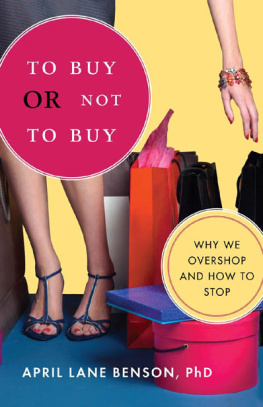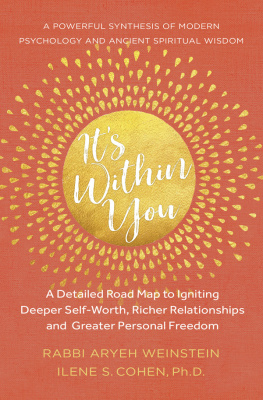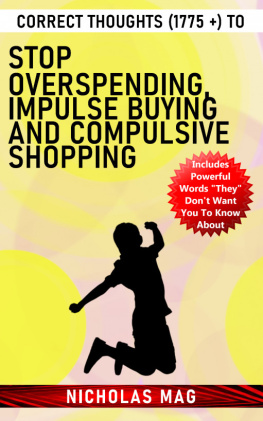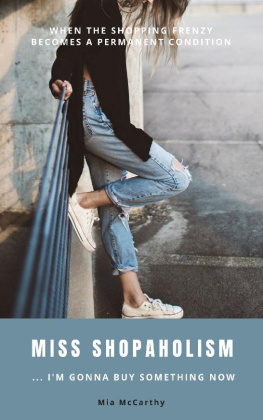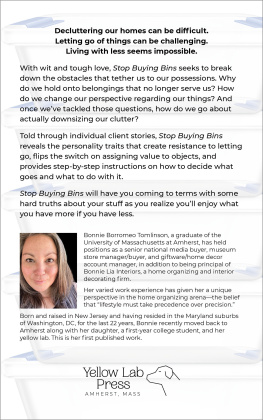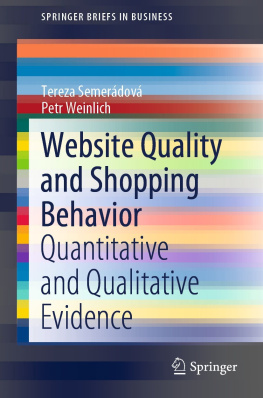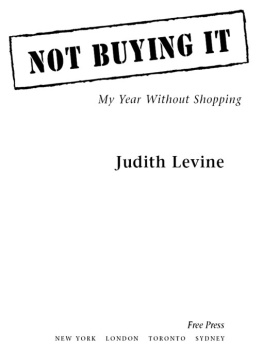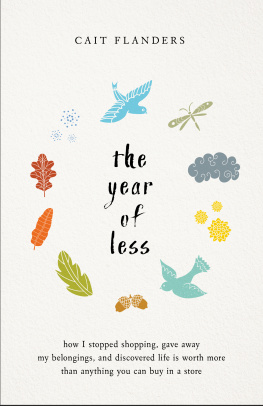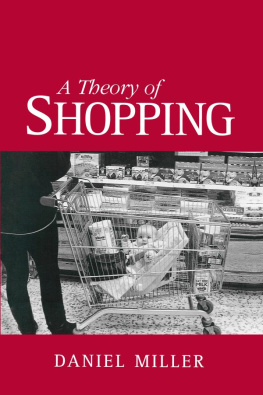This warm, wonderful book provides a road map for making the journey from overshopping to full recovery and life balance. I particularly enjoyed the use of mindfulness techniques. Every overshopper needs this book!
Olivia Mellan, Overcoming Overspending
An extremely helpful book. Dr. Benson provides a practical, step-by-step method for recognizing, controlling, and finally stopping a shopping problem. I recommend it without hesitation.
Lorrin Koran, MD, Stanford University Medical Center
If you are a compulsive or chronic shopperas millions arethis book may well save your sanity, your relationships, your marriage, or even your life.
Jerold Mundis, author of How to Get Out of Debt, Stay Out of Debt, and Live Prosperously
This book instructs wisely about the problem of compulsive buying and how it might be reasonably overcome.
New England Psychologist
ABOUT THE BOOK
Are you a shopaholic?
- Do you use shopping as a quick fix for the blues?
- Do you often buy things that you dont need or cant afford?
- Do your buying binges leave you feeling anxious or guilty?
- Is your shopping behavior hurting your relationships?
- Have you tried to stop but been unable to?
If so, you are not alone. Nearly 18 million Americans are problem shoppers, unable to break the buying habits that lead them into debt, damaged relationships, and depression. If this describes you, or someone you care about, the help you need is here.
Drawing on recent research and on decades of working with overshoppers, Dr. April Benson brings together key insights with practical strategies in a powerful program to help you stop overshopping. As you progress through this book, youll take back control of your shopping and spending and create a richer, more meaningful and satisfying life.
APRIL LANE BENSON, PhD, is a nationally known psychologist who specializes in the treatment of compulsive buying disorder. She has appeared on several national television programs including the Today Show, Good Morning America, and the CBS Evening News.
Sign up to learn more about our books and receive special offers from Shambhala Publications.

Or visit us online to sign up at shambhala.com/eshambhala.
To Buy
or Not to Bu y
Why We Overshop
and How to Stop
April Lane Benson, PhD

Trumpeter Books
An imprint of Shambhala Publications, Inc.
Horticultural Hall
300 Massachusetts Avenue
Boston, Massachusetts 02115
www.shambhala.com
2008 by April Lane Benson, PhD
Excerpt from Saint Francis and the Sow, from Mortal Acts, Mortal Words, by Galway Kinnell. Copyright 1980, and renewed 2008 by Galway Kinnell. Reprinted by permission of Houghton Mifflin Harcourt Publishing Company. All rights reserved.
All rights reserved. No part of this book may be reproduced in any form or by any means, electronic or mechanical, including photocopying, recording, or by any information storage and retrieval system, without permission in writing from the publisher.
Distributed in the United States by Random House, Inc., and in Canada by Random House of Canada Ltd
Interior design and composition: Greta D. Sibley & Associates
Library of Congress Cataloging-in-Publication Data
Benson, April Lane.
To buy or not to buy: why we overshop and how to stop / April Lane Benson.1st ed.
p. cm.
Includes bibliographical references.
eISBN 978-0-8348-2105-7
1. Compulsive shopping. I. Title.
RC569.5.S56B46 2008
616.8584dc22
2008024034
To the memory of my mother,
Frances Berman Lane Krebs Mehlman
Contents
To Buy or Not to Buyfor overshoppers, that is the question. This book is about answering that not-so-simple question. Its also about who you are, what you want, and what you really needand how your deepening understanding of this can help you stop overshopping. The underlying premise of the book is that when we overshop, though we often dont realize it, we are trying to fill emotional needs with material goods. This attempt, like trying to fit a square peg into a round hole, is doomed to failure: you simply cant buy self-esteem or self-acceptance or autonomy. Indeed, the more you focus on acquiring material goods, the less satisfied youre going to be.
What Ive learned from a decade and a half of knowing, studying, working with, and writing about overshoppersand from having been one myselfis that to change your behavior, youve got to change the way you feel about yourself and the way you go about meeting your authentic needs. To Buy or Not to Buy is an interactive guidebook for that transformation, in which the concepts, exercises, and activities build on each other, so that what you learn intellectually is regularly tested and reinforced at a gut level.
WHO THIS BOOK IS FOR
This book is for anyone with a shopping problem: anyone whose patterns of shopping and spending damage their relationships, their self-esteem, and their finances. Theres no one type of person who tends to be an overshopper. People with this problem differ in age and gender, social and economic status, buying patterns, and underlying motivations. This book is for you if youre a daily overshopper, if you shop only occasionally but go on binges when you do, or if youre a collector (which is often the way male overshoppers describe themselves). Its for you if you overshop to project a particular image, if you buy excessively for others, or if you buy multiple versions of the same item. Its also for you if you hunt relentlessly for bargains or if you constantly buy and return.
Youve got a shopping problem if you spend so much time, energy, or money on shoppingeven if you dont actually acquire stuffthat its impacting your life in a negative way. Perhaps youre one of the many whose attraction to a particular class of thingsjewelry or chess sets, clothing or teddy bears, shoes or old maps, electronics or baseball cardshas led to a mountain of debt or other financial problems. Or perhaps overshopping is affecting your work performance, your social life, or your family relationships, or your shopping addiction has put you on the wrong side of the law. This book is also for you if youre insulated from the financial consequences of your overshopping by inheritance or other wealth but youve lost sight of what really matters in life or you feel that your life lacks meaning.
IF YOU HAVE A SHOPPING PROBLEM, YOURE NOT ALONE
If any of the overshopping scenarios Ive sketched out speaks to you, know that youre not alone. According to a 2006 study conducted by the Stanford University School of Medicine, 5.8 percent of U.S. adults are overshoppersat least 17 million people. How can we begin to understand or explain this startling statistic?
Two factors, taken together, explain a lot. One is the ever-growing production of goods around the world. In more and more parts of the globe, economic growth is dependent upon selling goods to populations whose basic needs have already been met. To promote that goalto cultivate in the general public a powerful desire for goods they dont needa formidable array of resources has been mounted. Advertising and the media shape our material desires, and the credit industry makes these desires seem tantalizingly affordable.
Today, in order to promote the ceaseless stoking of economic engines, every one of us is targeted as a consumer. We are pushed, prodded,
Next page
